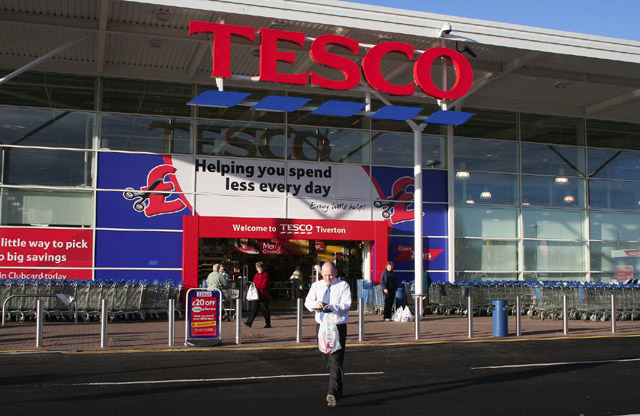
The NFU has met with Tesco representatives to discuss its recent pledge to source meat 'closer to home' and to build partnerships with British farmers.
At NFU Conference 2013 last week, Tesco chief Philip Clarke said they had introduced new testing processes in light of recent concerns from farming groups and consumers.
From July, he said, all chicken sold in its stores would be from British farms.
The retailer also announced its ambitions to build partnerships, become more transparent and to make 'real changes to the way Tesco source' its meat products.
NFU President Peter Kendall used his opening speech at the Conference to argue for a major shift in the way food is delivered. Shorter supply chains and British sourced beef was needed as the horse meat scandal showed failings in the current system, he argued.
Research showed customers want to see more British food on supermarket shelves with 82% of shoppers more likely to buy traceable food produced on British farms.
The NFU said it welcomed the sentiment of Tesco's announcements and is reassured that the sector’s biggest industry customer recognises the important role farmers play in delivering quality food for their consumers.
NFU President Peter Kendall said: "We recognise the significance of Tesco's commitments and will be working closely with its team to ensure that the retailer's sentiments and latest commitments deliver real value to the sustainability of the UK farming industry.
"What we want to see is measurable changes on sourcing, longer term commitments and improved relationships. The meeting was a first step in working towards these goals and it showed clear signs that Tesco wants to build partnerships.
"There is a lot of work to be done and the NFU will be working to help Tesco deliver."
Most major farming groups have highlighted failings in the supermarket supply chains since the horsemeat scandal broke.
"The squeezing of their suppliers margins and the relentless search for profit through buying cheaper product is the reason horsemeat is in their products" the National Beef Association said.
"The supermarkets spend millions on creating and protecting their brand but what is behind that brand is reflected in their own brand economy burgers. They are brands are funded by the exploitation of the consumer and the supplier."
Kendall called on the government to work with farmers to ensure they have all the tools to produce food and create 'a fair and transparent supply chain, for a home market.'
NFU deputy Stephen James said: "Farmers have been furious about what has happened."
"They have spent many years working to ensure the supply chain is fully traceable from farm to pack and building strong principles which are embodied in assurance schemes like Red Tractor. For me this is fundamental for consumer confidence."
"But more than that, I want to see retailers working on re-building consumer trust, improving transparency and so partnership with farmers and the rest of the supply chain is critical. However, what we see currently in some sectors is real short-termism."
"The margin distribution in the supply chain needs more transparency and joined-up thinking to tackle the dual challenges of volatility and environmental pressures."
57% of people, according to the One Poll survey, said they found information on food origin either confusing or very confusing. "This has to change" James said.
Farming associations have highlighted several issues which could impinge on the UK's ability to deliver food, which include the current Common Agricultural Policy reforms, the on-going threat to beef and dairy farmers from TB and the need for shorter supply chains as shown by the meat scandal.
"It's not just about today’s 63 million UK consumers" Kendall said.
"As I've often said, standing still production-wise isn't an option – on the self-sufficiency scale it takes us backwards."
"The latest Office of National Statistics projections suggest that by 2021 – that's within eight years – the population in England alone will have increased by over 4.5 million people. That's practically four Birmingham’s worth of extra mouths to feed on our doorstep. This is a massive opportunity for all of us."
